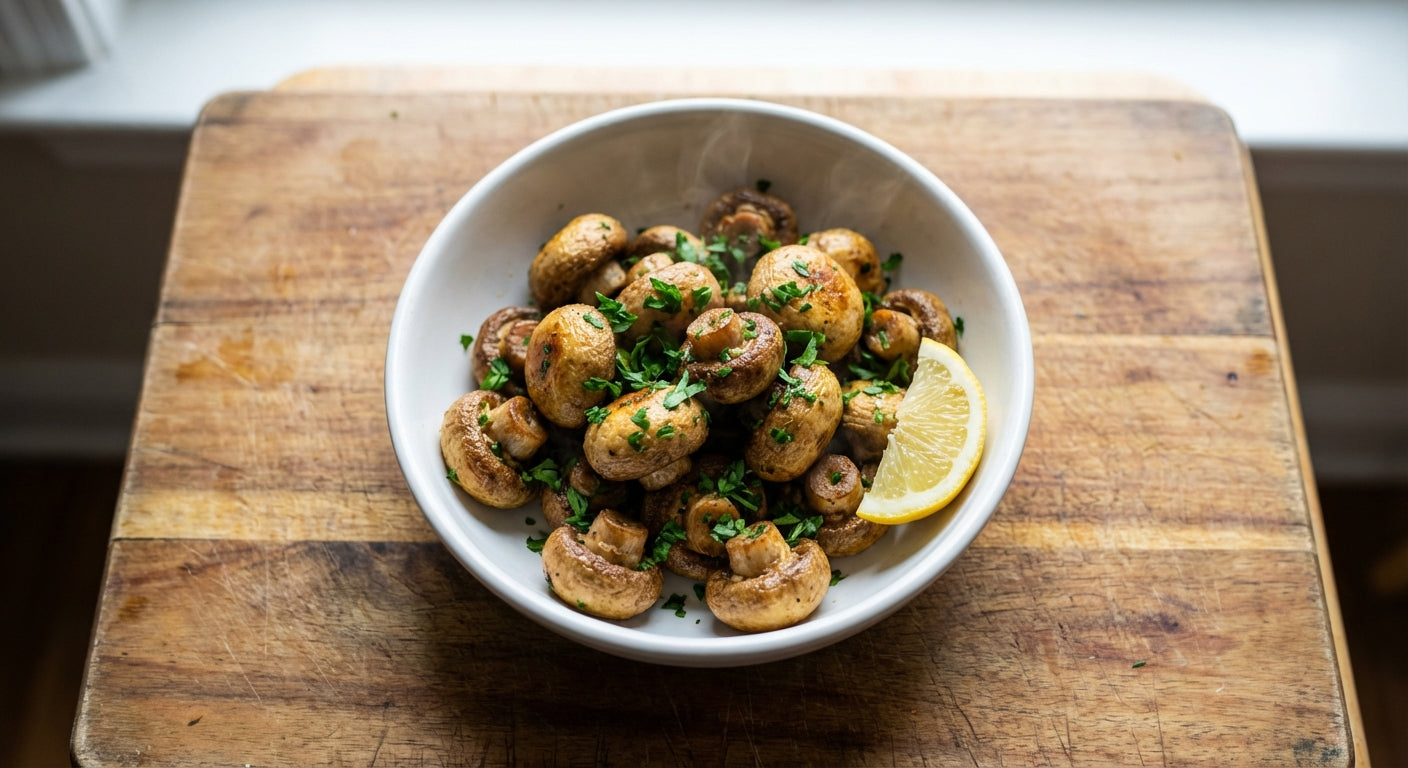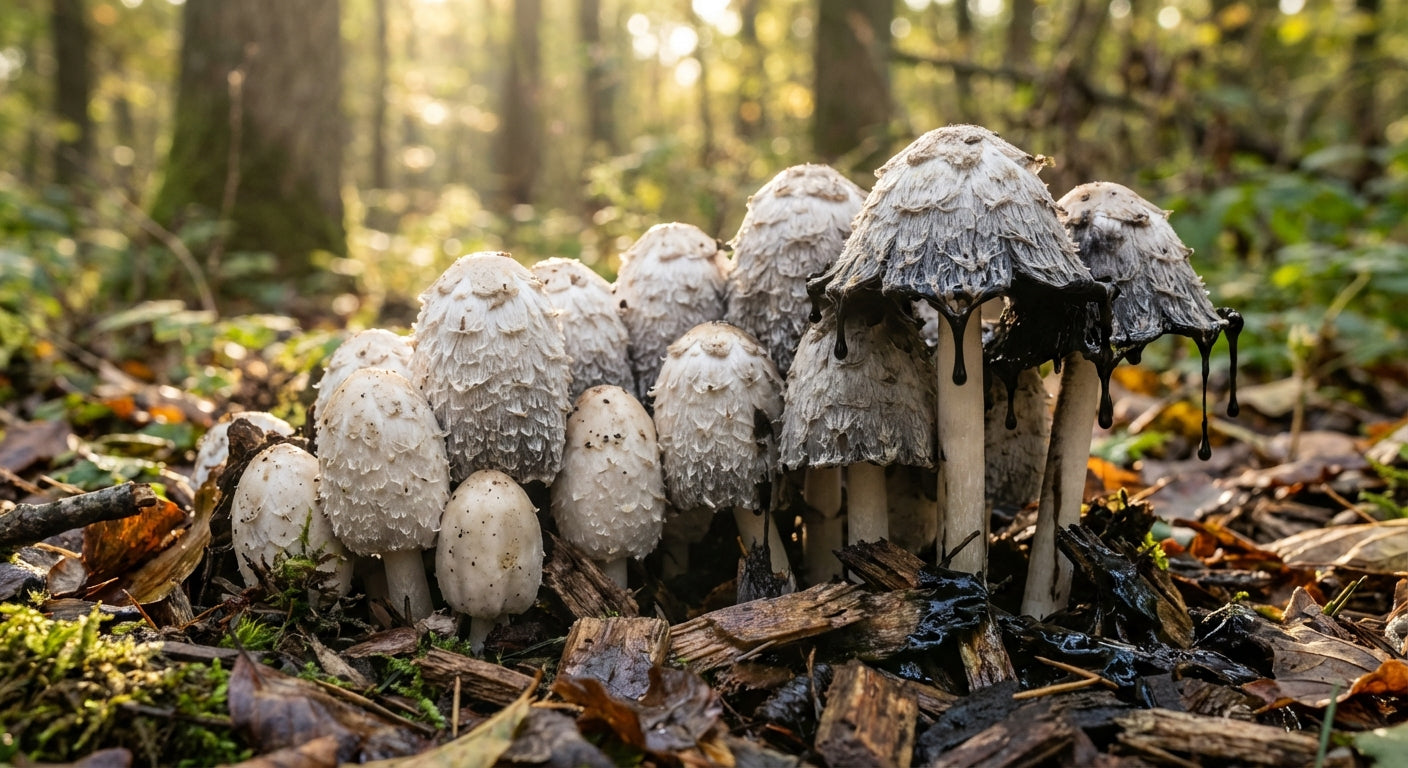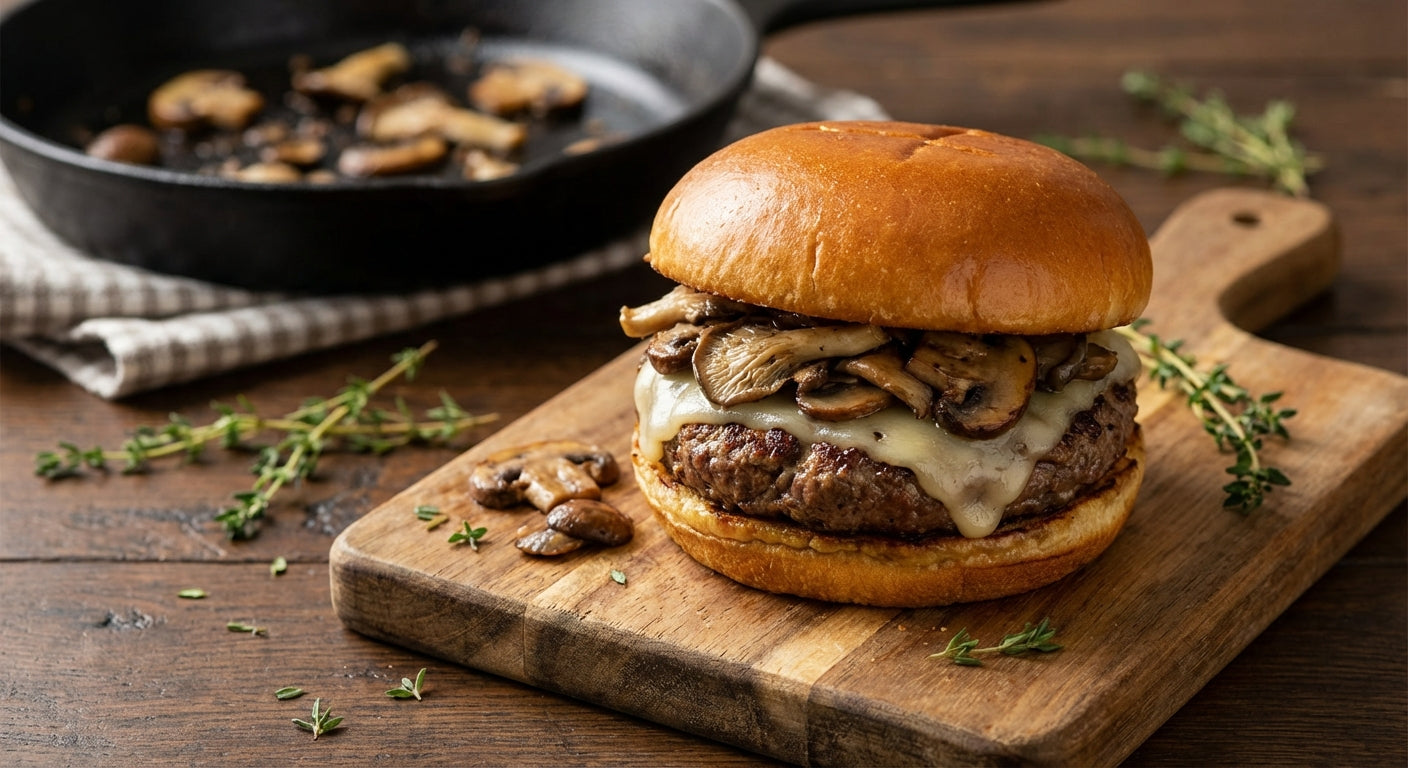Introduction
Lion's Mane mushroom (Hericium erinaceus) has surged in popularity as a nutritional powerhouse with cognitive-enhancing properties. This distinctive, shaggy white mushroom resembling a lion's mane has been used in traditional Chinese medicine for centuries and is now gaining recognition in Western wellness circles for its potential brain-boosting and nerve-regenerating capabilities.
As men increasingly turn to natural supplements to support hormonal health, questions about Lion's Mane's effects on testosterone have emerged. Testosterone, the primary male sex hormone, plays crucial roles in muscle development, bone density, libido, energy levels, and overall vitality. With declining testosterone levels becoming a concern for many men as they age, the search for natural testosterone supporters has intensified.
In this comprehensive article, we'll examine the scientific evidence regarding Lion's Mane mushroom and its potential relationship with testosterone. We'll explore what research actually shows, separate fact from fiction, and provide a nuanced understanding of how this medicinal fungus might influence hormonal health. Whether you're considering adding Lion's Mane to your supplement regimen or simply curious about its effects, this evidence-based guide will help you make informed decisions about Lion's Mane and its potential impact on testosterone and overall hormonal well-being.
Understanding Lion's Mane Mushroom
What Is Lion's Mane?
Lion's Mane mushroom (Hericium erinaceus) is a distinctive fungus known for its shaggy, cascading white spines that resemble a lion's mane. Native to North America, Europe, and Asia, this mushroom grows on hardwood trees and has been prized for both culinary and medicinal purposes for centuries.
Unlike many medicinal mushrooms that have a tough, woody texture, Lion's Mane has a seafood-like consistency when cooked, often compared to crab or lobster meat. Its flavor is described as mild, sweet, and somewhat reminiscent of seafood, making it popular in gourmet cooking.
In traditional Chinese medicine, Lion's Mane (known as Hou Tou Gu) has been used to support digestive health, combat fatigue, and boost overall vitality. Japanese and Korean traditional medicine systems have similarly valued this mushroom for its health-promoting properties.
Modern interest in Lion's Mane has primarily focused on its potential neurological benefits, with research suggesting it may support cognitive function, mood stability, and nerve health. The mushroom has gained popularity in nootropic circles as a potential natural cognitive enhancer.
Key Bioactive Compounds
Lion's Mane mushroom contains several bioactive compounds that contribute to its potential health benefits:
-
Hericenones: Found in the fruiting body, these compounds may promote nerve growth factor (NGF) production, supporting brain health and neuronal growth.
-
Erinacines: Present in the mycelium (root-like structure), these compounds can also stimulate NGF production and may cross the blood-brain barrier more effectively than hericenones.
-
Beta-glucans: These complex polysaccharides have immune-modulating properties and are found in many medicinal mushrooms, including Lion's Mane.
-
Sterols: Including ergosterol (provitamin D2), which may contribute to the mushroom's potential effects on various bodily systems.
-
Polypeptides and proteins: Lion's Mane contains various bioactive proteins that may contribute to its overall health effects.
-
Antioxidants: The mushroom contains several compounds with antioxidant properties that help combat oxidative stress.
These compounds work synergistically to produce Lion's Mane's various health effects, though it's worth noting that their concentration can vary significantly based on growing conditions, the part of the mushroom used, and extraction methods.

The Testosterone Question
What Research Actually Shows
When examining whether Lion's Mane increases testosterone, it's essential to look at the direct scientific evidence:
Current Studies on Lion's Mane and Testosterone
To date, there are no human clinical trials that directly demonstrate Lion's Mane mushroom increases testosterone levels. The research landscape includes:
-
Limited animal studies: A few rodent studies have examined Lion's Mane's effects on reproductive hormones, but with mixed or inconclusive results regarding testosterone specifically.
-
Absence of direct hormone research: Most human studies on Lion's Mane have focused on its neurological benefits rather than hormonal effects.
-
Lack of traditional use for hormonal health: Historically, Lion's Mane hasn't been used specifically for testosterone enhancement in traditional medicine systems.
A 2020 animal study published in the Journal of Medicinal Food found that Lion's Mane extract did not significantly alter testosterone levels in male rats, even while showing other beneficial effects on overall health markers.
Indirect Mechanisms That May Influence Hormonal Health
While direct testosterone enhancement hasn't been demonstrated, Lion's Mane may influence hormonal health through indirect pathways:
-
Stress reduction: Some research suggests Lion's Mane may help reduce stress and anxiety levels. Since chronic stress can lower testosterone production, stress reduction might indirectly support healthy testosterone levels.
-
Sleep improvement: Preliminary research indicates Lion's Mane may improve sleep quality in some individuals. Quality sleep is essential for optimal testosterone production.
-
Antioxidant effects: The antioxidant compounds in Lion's Mane may help protect testicular cells from oxidative damage, potentially supporting their function.
-
Anti-inflammatory properties: Chronic inflammation can disrupt normal hormonal production. Lion's Mane's anti-inflammatory effects might help maintain a healthier hormonal environment.
These indirect mechanisms suggest Lion's Mane could potentially support overall hormonal health, but they don't constitute evidence for direct testosterone enhancement.
Common Misconceptions
Several misconceptions about Lion's Mane and testosterone have circulated in wellness communities:
Confusion with Other Adaptogens
One source of misconception is the conflation of Lion's Mane with other adaptogenic herbs that may influence testosterone more directly:
- Some adaptogens like Ashwagandha have demonstrated more direct effects on testosterone levels in research studies
- Cordyceps, another medicinal mushroom, has shown some potential testosterone effects in limited studies
- When these effects are generalized to all medicinal mushrooms, including Lion's Mane, misconceptions arise
Misinterpretation of Energy and Vitality Effects
Lion's Mane users sometimes report increased energy and vitality, which might be misattributed to testosterone enhancement:
- Improved energy could result from better sleep quality, reduced anxiety, or enhanced cognitive function
- Enhanced mental clarity might be confused with the focus and drive sometimes associated with healthy testosterone levels
- Improved overall well-being might feel similar to what one would expect from optimized hormones
Extrapolation from Animal Studies
Some claims about Lion's Mane and testosterone stem from over-interpretation of limited animal research:
- Results from rodent studies don't always translate to human physiology
- Animal studies often use much higher concentrations of compounds than would be practically consumable by humans
- Preliminary research findings are sometimes presented as conclusive evidence
Actual Proven Benefits of Lion's Mane
While testosterone enhancement isn't currently supported by strong evidence, Lion's Mane has several well-researched benefits:
Cognitive and Neurological Benefits
Lion's Mane's most substantiated benefits relate to brain health:
Nerve Growth Factor (NGF) Stimulation
Research has demonstrated that compounds in Lion's Mane can stimulate the production of Nerve Growth Factor:
- NGF is a protein that maintains and regenerates neurons
- This stimulation may support neural plasticity and brain health
- A 2012 study in Phytotherapy Research found that Lion's Mane extract enhanced NGF synthesis in human cells
Cognitive Support
Human clinical trials have shown promising results for cognitive function:
- A double-blind, placebo-controlled study published in Phytotherapy Research found that older adults with mild cognitive impairment showed significant improvements in cognitive function scores after consuming Lion's Mane for 16 weeks
- The benefits disappeared when supplementation stopped, suggesting ongoing use may be necessary for sustained effects
- Additional studies have demonstrated improvements in memory, focus, and mental clarity
Mood Regulation
Lion's Mane may offer benefits for mood and emotional well-being:
- A 2020 study in the Journal of Medicinal Food found that Lion's Mane extract reduced depression and anxiety symptoms in mice
- A small human study published in Biomedical Research found that menopausal women who consumed Lion's Mane cookies for 4 weeks reported lower levels of irritability and anxiety compared to the placebo group
- The mushroom's effects on the gut microbiome may influence the gut-brain axis, potentially affecting mood
Digestive and Gut Health
Lion's Mane offers notable benefits for digestive health:
Gastric Protection
Research has demonstrated protective effects for the digestive tract:
- Lion's Mane extract has shown the ability to protect against gastric ulcers in animal studies
- The mushroom may help maintain the integrity of the gastric mucosa (stomach lining)
- These effects may be due to its ability to inhibit H. pylori growth and reduce inflammation
Gut Microbiome Support
Emerging research suggests Lion's Mane may support a healthy gut microbiome:
- Prebiotic properties may help nourish beneficial gut bacteria
- A 2017 animal study found that Lion's Mane enhanced the growth of beneficial gut bacteria while reducing potentially harmful species
- The gut-brain connection means these effects could also indirectly support cognitive and emotional well-being

Potential Effects on Overall Men's Health
While Lion's Mane may not directly boost testosterone, it could still offer benefits for men's overall health:
Supporting Active Lifestyles
Lion's Mane may benefit physically active men through several mechanisms:
Recovery Support
The mushroom's anti-inflammatory properties could aid recovery:
- Reducing exercise-induced inflammation may support faster recovery between workouts
- The antioxidant content could help combat oxidative stress from intense physical activity
- Better recovery may indirectly support hormonal balance, including testosterone production
Energy and Endurance
Some users report improved energy levels with Lion's Mane supplementation:
- Enhanced mitochondrial function may contribute to better energy metabolism
- Improved sleep quality could lead to better daytime energy levels
- Reduced mental fatigue might allow for more focused, productive workouts
Stress Management
Modern life's chronic stress can negatively impact men's hormonal health:
Adaptogenic Properties
Lion's Mane demonstrates adaptogenic qualities that may help the body manage stress:
- Animal studies show reductions in stress markers with Lion's Mane supplementation
- The mushroom may help modulate the hypothalamic-pituitary-adrenal (HPA) axis, which influences stress response
- By potentially reducing chronic stress, Lion's Mane might indirectly support healthier testosterone levels
Cortisol Regulation
High cortisol levels can suppress testosterone production:
- While research specifically on Lion's Mane and cortisol is limited, its stress-reducing properties suggest a potential beneficial effect
- By potentially helping to normalize stress hormone levels, Lion's Mane could create a more favorable environment for testosterone production
How to Use Lion's Mane
If you're interested in Lion's Mane for its well-established benefits, here's guidance on usage:
Forms and Preparations
Lion's Mane is available in several forms:
Supplements
Supplement forms offer convenience and standardized dosing:
- Capsules and tablets: Typically contain 500-1000mg of Lion's Mane extract or powder per serving
- Powders: Can be mixed into beverages, smoothies, or foods
- Tinctures: Liquid extracts that can be added to water or taken directly
Whole Mushroom Options
For those preferring less processed options:
- Fresh mushrooms: Can be cooked and eaten as a gourmet food (sautéed, baked, or added to soups)
- Dried mushrooms: Can be rehydrated and cooked, or used to make teas and broths
- Lion's Mane coffee/tea blends: Convenient pre-made beverages with Lion's Mane added
Recommended Dosages
Optimal dosages haven't been definitively established, but common recommendations include:
- Extract capsules: 1000-3000mg daily, often divided into 2-3 doses
- Powders: 1-3 teaspoons (2-5 grams) daily
- Tinctures: 1-2 droppers (1-2mL) 1-3 times daily
Most clinical studies showing cognitive benefits have used dosages equivalent to 3-5 grams of dried mushroom daily for periods of 4-16 weeks.
Quality Considerations
The effectiveness of Lion's Mane supplements depends significantly on quality factors:
Sourcing and Processing
Look for products that provide information about:
- Mushroom part used: Fruiting body extracts typically contain more beneficial compounds than mycelium-on-grain products
- Extraction method: Dual extraction (both water and alcohol) ensures both water-soluble and alcohol-soluble compounds are present
- Growing conditions: Organic certification helps ensure the mushroom is free from pesticides and other contaminants
- Beta-glucan content: Higher levels generally indicate better quality (more beneficial than a "polysaccharide" measure, which can be inflated with starchy fillers)
Third-Party Testing
Quality products often undergo independent verification:
- Look for supplements tested for purity and potency
- Certificates of analysis should be available upon request
- Reputable brands generally provide transparency about their testing processes

Combining Lion's Mane with Other Supplements
For those interested in holistic approaches to health, including hormonal balance:
Complementary Supplements
Several evidence-based supplements may complement Lion's Mane:
For Cognitive Enhancement
To maximize Lion's Mane's brain benefits:
- Bacopa Monnieri: May enhance memory and cognitive function
- Omega-3 fatty acids: Support overall brain health and reduce inflammation
- B vitamins: Essential for neurological function and energy metabolism
For Men's Health Support
For those specifically concerned about hormonal health:
- Ashwagandha: Has demonstrated effects on testosterone levels and stress reduction in clinical studies
- Zinc: An essential mineral for testosterone production and overall reproductive health
- Vitamin D: Plays a key role in hormone production, including testosterone
- Magnesium: Supports numerous bodily functions including hormone production and regulation
Lifestyle Approaches
Supplements work best alongside healthy lifestyle practices:
Natural Testosterone Support
For maintaining healthy testosterone levels naturally:
- Resistance training: Regular strength training has been shown to boost testosterone
- Adequate sleep: 7-9 hours of quality sleep is essential for optimal hormone production
- Stress management: Practices like meditation, deep breathing, or yoga can help reduce stress hormones that interfere with testosterone
- Balanced diet: Emphasizing whole foods, healthy fats, and adequate protein supports hormonal health
- Maintaining healthy weight: Excess body fat can convert testosterone to estrogen
Frequently Asked Questions
Can Lion's Mane Affect Libido or Sexual Function?
While some users report improved libido with Lion's Mane use, scientific evidence is limited:
- Anecdotal reports: Some men report enhanced sexual desire and function when taking Lion's Mane, but these effects have not been validated in clinical studies
- Indirect mechanisms: Any effects on libido might stem from improved mood, reduced anxiety, or better sleep rather than hormonal changes
- Research gap: No human studies have specifically examined Lion's Mane's effects on sexual function
- Neural support: The mushroom's neuroprotective properties might theoretically support neural pathways involved in sexual response, but this remains speculative
If considering Lion's Mane for sexual health, understand that effects are likely individual and may result from overall well-being improvements rather than direct hormonal influence.
How Long Does it Take to Experience Benefits from Lion's Mane?
Timeframes for experiencing Lion's Mane's effects vary:
- Cognitive benefits: The most robust human study showed cognitive improvements after 8-16 weeks of consistent use
- Mood effects: Some users report noticeable improvements in mood and anxiety within 2-4 weeks
- Energy and focus: Enhanced mental clarity and energy may be noticeable within 1-2 weeks for some individuals
- Individual variation: Response times vary significantly based on individual physiology, dosage, product quality, and the specific benefits being sought
Consistency appears key—the most significant benefits tend to emerge with regular, daily use over several months rather than sporadic consumption.
Are There Any Hormonal Side Effects of Lion's Mane?
Current research doesn't indicate significant hormonal side effects:
- General safety profile: Lion's Mane is generally recognized as safe with few reported adverse effects
- Hormonal stability: No research suggests Lion's Mane disrupts hormonal balance or causes hormonal side effects
- Estrogen questions: Some online sources speculate about effects on estrogen, but no convincing evidence shows Lion's Mane has estrogenic activity
- Individual responses: As with any supplement, individual responses can vary, and some people may be more sensitive to its effects
The absence of reported hormonal side effects in research and traditional use suggests Lion's Mane is unlikely to cause significant hormonal disruptions for most users.
How Does Lion's Mane Compare to Supplements Known to Support Testosterone?
Lion's Mane differs significantly from established testosterone-supporting supplements:
- Ashwagandha: Multiple human clinical trials show Ashwagandha can increase testosterone levels by 10-22% in men, particularly those with suboptimal levels. Lion's Mane lacks comparable evidence.
- Zinc and Vitamin D: These nutrients are directly involved in testosterone production, with deficiencies clearly linked to reduced testosterone levels. Lion's Mane works through different mechanisms unrelated to these pathways.
- Fenugreek and Tribulus: These herbal supplements have mixed but more substantial evidence for testosterone effects than Lion's Mane.
- D-Aspartic Acid: Shows temporary testosterone increases in some studies, working through direct hormonal pathways unlike Lion's Mane.
For those specifically seeking testosterone support, evidence-backed options like Ashwagandha, addressing nutrient deficiencies, and lifestyle modifications likely offer more direct benefits than Lion's Mane.
Conclusion
Based on current scientific evidence, Lion's Mane mushroom does not appear to directly increase testosterone levels. The lack of human clinical trials demonstrating hormonal effects, combined with the absence of traditional use for this purpose, suggests that Lion's Mane should not be primarily sought out as a testosterone booster.
However, this doesn't diminish Lion's Mane's value as a health supplement. Its well-researched cognitive and neurological benefits, including support for nerve growth factor production, memory, and focus, are substantiated by both laboratory and human studies. The mushroom also offers promising benefits for digestive health, stress reduction, and overall wellbeing that may indirectly support a healthier hormonal environment.
For men concerned about testosterone levels, a more evidence-based approach would include:
-
Focusing on established lifestyle factors known to support testosterone: resistance training, adequate sleep, stress management, and a balanced diet rich in healthy fats and proteins
-
Addressing potential nutrient deficiencies that affect testosterone production, particularly zinc, vitamin D, and magnesium
-
Considering supplements with stronger evidence for testosterone support, such as Ashwagandha, if appropriate after consulting with a healthcare provider
-
Using Lion's Mane for its proven benefits, particularly cognitive enhancement and stress reduction, which may create a more favorable overall environment for hormonal health
As research into medicinal mushrooms continues to evolve, our understanding of Lion's Mane's effects on hormonal health may expand. For now, it's best approached as a powerful cognitive supporter rather than a direct testosterone enhancer.
When selecting Lion's Mane supplements, quality matters significantly—look for products derived from the fruiting body, with transparent information about extraction methods and standardization. Consistency in use is key to experiencing benefits, with most positive research results coming from regular daily consumption over periods of 8-16 weeks or longer.
Ultimately, Lion's Mane can be a valuable addition to a holistic health regimen, particularly for those seeking cognitive support, stress reduction, and digestive health benefits—even if testosterone enhancement isn't among its direct effects.
















Share:
Where to Find Lion's Mane Mushroom: A Nature Guide
Lion’s Mane Mushroom Cocktail: A Bold New Way to Drink Smart